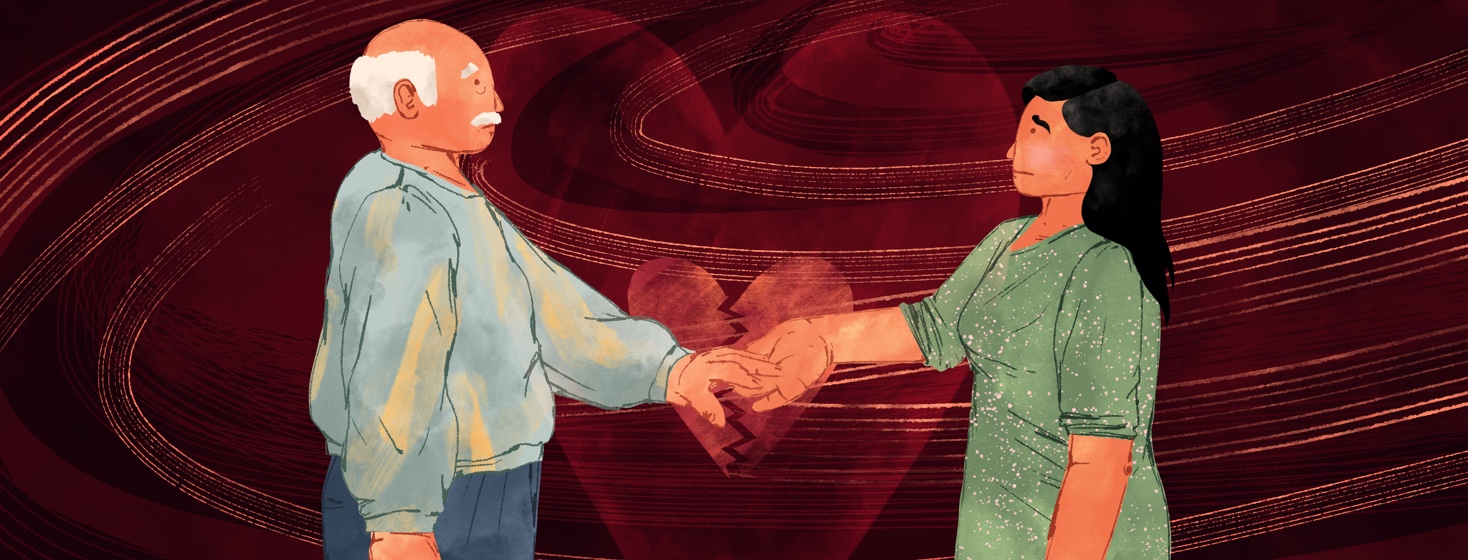Like Daughter, Like Father: Role Reversal and Tough Decisions
I had a rough time starting school when I was five. I was a shy kid around strangers and had never really been away from Mama and Daddy. On the odd occasion I was away from them, I was still with family members. I didn’t go to daycare or a babysitter. To be blunt, I screamed and wailed and cried until my face was red and puffy every morning that August in 1986.
Looking back, I likely had some major separation anxiety, and my parents, and grandparents a time or two, broke my heart every time they forced me to go. It seemed cruel, but they knew it was necessary and was for the best. I know that now, but you couldn’t have hammered that theory into my head as a mad, tight-fisted, red-faced five year old.
Daddy in the hospital
Little did I know that nearly thirty years later, I would find myself in some time-traveling, alternate universe, twilight zone sort of reality. I never thought I would be a caregiver to my parent. Daddy had a massive brain hemorrhage shortly after back-to-school time in 2015. By then, I had been working in the education system for the larger part of the last two decades. Who could have predicted that one? The fall of 2015 was the most tumultuous school year beginning I’d had since 1986, and that was a rough one. Only, this time it wasn’t me who was throwing the tantrums.
Daddy was released after a week-long hospital stay into a nursing facility for rehabilitation. The hemorrhage had exacerbated ailments that he had long since dealt with and added a few new problems to the list. He had physical setbacks that may have been the most obvious at first, but after the first attempted conversation, we could all see that the trauma to his brain had caused problems well beyond physical deficits.
Daddy struggled with speech and words
The most apparent of his problems being the aphasia he was suffering from. He had a very hard time recalling words and forming sensical sentences. His doctor told us he had dementia shortly after. All of these things compiled with a strange environment with strange people left him reeling.
He had been kicked out, ripped from his family, and thrown away just like I had been day after day in kindergarten. You and I know that’s not true, but you and I also know that can be what it feels like when you are forced to face this kind of change. I specifically remember Daddy leaning over for a hug and saying, “Love you, baby” before kicking me out of his work truck onto the cold concrete in front of the school on days when I had successfully warded off a bus trip.
Caregiver to a parent: Role reversal
His words confused me and made my eyes well, and my throat burn. They didn’t love me. If they did, why did they continue to break my heart every day? Decades later, I was hit with some major déjà vu. When we would visit Daddy in the beginning, he was miserable. He screamed, and cried, and reached for us like an overgrown toddler when we had to leave. He couldn’t wrap his head around why we would leave him there. We practically had to run out. It was devastating for both him and us.
I didn’t understand at just barely five years old that I needed to be away from home. I needed to get a start on learning because it was best for me. I needed to be with those who were qualified professionals in early education. What he didn’t understand years later was that we weren’t qualified to do his therapy with him. We couldn’t rehabilitate him. None of us were medical professionals, and even if we were, we had to work.
Daddy got used to his surroundings
Unfortunately for Daddy, none of his kids became independently wealthy. His health insurance coverage proved to be rocky at best. Also, he was a big, heavy, strong man that we couldn’t physically handle, especially when he was being headstrong. We couldn’t do it physically or financially. It wasn’t in the cards.
I didn’t stay miserable in school. I grew to love it. Really love it. I loved it so much that I wound up making a career of it, and have spent more time in elementary school buildings than anywhere else in my life. Daddy didn’t stay miserable either. It took some work, and coaxing, and the expertise of a behavioral facility followed by another placement in an amazing nursing home, but he came around.
He grew to enjoy visits and hugged us goodbye again without a fight. He learned to love sitting at the koi pond on the grounds sipping his milkshakes. He learned to laugh again. He found peace in the end. That, in turn, gave us peace.
Caregiver to a parent: Hard decisions
I said all of that to say this: sometimes you have to make the hardest decisions with the best of intentions whether you are a caregiver to parents or someone else. Kids don’t always know what’s best, and they certainly don’t understand it. The same goes for those being affected by dementia and Alzheimer’s disease.
The best choices given in any situation are often the most difficult to make. Don’t beat yourself up for doing what’s best, even if it causes a little (or a lot) of temporary discomfort. It’s what parents do. It’s also what caregivers do.
Are you a caregiver to a parent? We want to hear your story!

Join the conversation